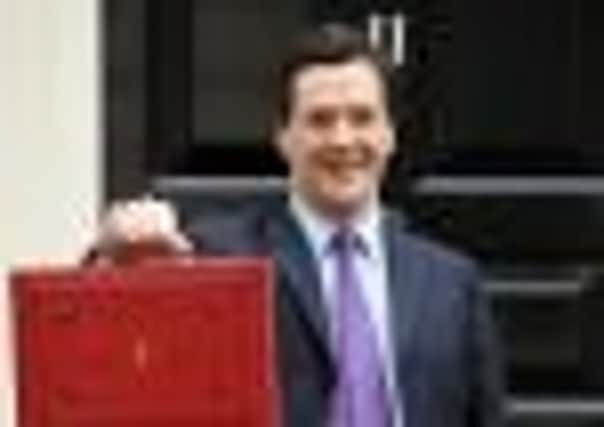Broke Britain needs to borrow an extra £111bn


The Office of Budget Responsibility (OBR) yesterday made it clear that the UK needs to prepare for the long haul on the road to recovery from an economic downturn that began with the banking crisis of 2007 and 2008.
It forecast that growth in the UK this year would be just 0.9 per cent and a mere 0.7 per cent next year.
Advertisement
Hide AdAdvertisement
Hide AdThis compared to its predictions of 1.7 per cent for 2011-12 and 2.5 per cent for 2012-13, which it made in March and means the government will have to borrow an extra £111 billion over the five years up to 2015-16.
The OBR also made it clear that while it expects the UK to avoid a double-dip recession, this depends on the eurozone getting its house in order.
Robert Chote, the chairman of the OBR, warned that a “much worse outcome is far more likely than a much better outcome” for the eurozone.
There was a generally gloomy picture for jobs with unemployment, already at 2.62 million, expected to be 8.1 per cent this financial year and rising to 8.7 per cent next year and dropping to 6.2 per cent in 2015-16. The effect on jobs is, according to the OBR, also going to be felt worst in the public sector, with the organisation predicting that 710,000 jobs will be lost between 2010 and 2015 compared to its previous estimate of 400,000.
Mr Chote said the economy was forecast to shrink by 3.5 per cent overall by 2016.
He said: “The economy has grown much less strongly this year than we expected at the time of the March budget, largely because higher than expected inflation has squeezed household income and consumer spending. We expect the underlying momentum of the economy to weaken further during the final quarter of this year but then to pick up gradually through next year, assuming that the euro area struggles through its difficulties.
“Even so, we forecast little increase in headline GDP until the second half of next year and we expect GDP to grow by 0.7 per cent in 2012 as a whole.
“We are also more pessimistic about the economy’s medium-term growth prospects and this is for two main reasons.
Advertisement
Hide AdAdvertisement
Hide Ad“First, there appears to be less spare capacity in the economy than we would have expected given its weakness.
“Second, the economy’s productive potential has increased unexpectedly slowly since the end of the recession.”
Mr Chote also admitted that it was unclear why production in the UK was failing to recover at the expected rate, raising further concerns about the strength of the overall recovery.
The report in the OBR’s Blue Book cast a shadow over Mr Osborne’s autumn statement, although Mr Chote insisted that the measures in the statement – particularly more constraints on public pay – would put Britain back on track.
Mr Osborne admitted the recovery had been knocked off course, but insisted that if his critics accepted the OBR’s figures they also had to accept the analysis behind them.
The OBR had mainly blamed the “external inflation shock” of rising fuel and food prices, as well as arguing that the boom which preceded the crisis had been bigger and more unsustainable than previously believed.
Mr Osborne said: “The result is that the OBR have significantly reduced their assumptions about the spare capacity in the economy – and the trend rate of growth.
“And this increases their estimate of the proportion of the deficit that is structural – in other words, the part of the deficit that doesn’t disappear even when the economy recovers. So our debt challenge is even greater than we thought because the boom was even bigger, the bust even deeper, and the effects will last even longer.”
Advertisement
Hide AdAdvertisement
Hide AdMr Osborne claimed that if Labour’s plans for higher spending and a cut in VAT had been adopted the UK would be forced to borrow £100bn more by 2015.
Labour disputed this, claiming that the extra growth its plans would bring would reduce borrowing by £37bn. But Mr Osborne said the public could see through Labour’s claims.
“People in this country understand the problems Britain faces,” he said. “They can watch the news any night of the week and see for themselves the crisis in the eurozone and the scale of the debt burden we carry.
“And people know that promises of quick fixes and more spending this country can’t afford, at times like this, are like the promises of a quack doctor selling a miracle cure.”
Labour shadow chancellor Ed Balls said the economy was flatlining and the country was suffering “all of the pain and none of the gain” at the government’s hands.
Mr Balls said the OBR figures showed the government’s austerity agenda had been “entirely counter-productive and self- defeating”.
Analysts said the OBR’s predictions meant that the Chancellor could still reach his deficit-reduction target and turn the economy around, but only just.
Esmond Burnie, PwC chief economist in Scotland and Northern Ireland, said: “No-one should be surprised that OBR had to downgrade its UK growth forecasts for 2011 and 2012. This statement from the OBR concedes that the 2008-9 recession and its aftermath have done major and lasting damage to the UK economy. A number of years of below-average investment imply that the growth of productive capacity has fallen below its trend level.
“That means that growth rates of productivity have been and will continue to be disappointing.”